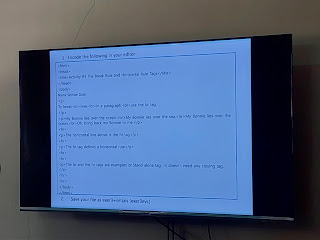Followers
Friday, December 6, 2024
Skills in Bloom, Growth to Consume
Standing Tall, Empowering Women’s Role
Imagine waking up every day to a reality where one out of three women globally faces abuse. It's more than just a number; it's a call for attention that resonates in our schools, shops, and even our own living rooms. Here in the Philippines, the problem is more personal. As per the 2022 National Demographic and Health Survey, almost one in five women has experienced at least one type of emotional, physical or sexual violence perpetrated by an intimate partner. This is why the presence of the Anti-Violence Against Women and Children (VAWC) Act 2004, or Republic Act (R.A. No. 9262, a beacon to lead hope and justice. It's not just a law but a call to action for every Filipino to rise and fight against this pervasive social injustice.
Awareness, by itself, will not be able to break up the systems of violence that underlie it. The greatest effect of the 18-day Campaign is to use learning to action. Why do victims choose silent suffering over speaking out against abuse? Why are abusers protected by cultural norms? Those uncomfortable questions force us to grapple with the societal issues that allow violence to live on. R.A. 9262 directly tackles these concerns, affording not only women, but the children, born legitimate or not, a protection against violence perpetrated against them. Its provisions, such as protection orders and penalties against abusers make it more accountable and enable the victim to regain his life. The law alters relationships, so that even dating couples are accountable and victims are protected from the emotional and psychic abuses of relationship. With this extensive coverage, it is paramount in fostering a culture of zero tolerance of abuse.
In contrast, statutes as Republic Act (R.A. No. 7877, the Anti-Sexual Harassment Act of 1995, and R.A. 11313, also the Safe Spaces Act of 2019, are also pieces of legislation that safeguard women from violence. These laws don't just protect women; they make us think about how we conceptualize safety and respect in our daily lives This legislation defines sexual harassment as any unwelcome sexual behavior or proposition that is made by a person of power, like a professor, employer or supervisor, for which submission is a prerequisite for employment or academic standing. The importance of R.A. 7877 lies in its emphasis on accountability. It is able to instill systems of, for example, grievance committees, whereby victims are provided with a safe environment to make reports. In this way it not only penalizes violators but also delivers an unambiguous message that abuse of power will not be accepted.
Even though both laws are designed to protect against harassment and violence, they provide strong rules when taken together. All this has a tendency to remind us that it is just an elementary right that cannot be tolerated by mere respect and safety. Students and citizens alike, we must uphold these statutes, not merely by following the rules, but by setting an example of their principles. Not through that the power of laws lies and that only faithful as people believe in them. The real question is whether we are prepared to stand up, speak out, and make our spaces—be it the classrooms, offices, streets, or even online truly safe for all?
Together, these statutes create a legal framework that protects the common experience of gender-based violence and harassment. These laws target abuse in all its aspects and contexts by offering victims protection, criminal responsibility for offenders, and a vision for improved safety of society. However, the law is not only a means for achieving justice; it is also a means for social cultural change. They encourage all of their citizens to stand up and challenge the stereotypical rules, abuses of power, and to engineer the conditions in which equality and respect will prosper. Collectively, as a nation commitment to these statutes shapes the future we are all working to create-a future where no woman, child or person is living in fear.
References:
Dalli, H., & Jourová, V. (2017, February 3). Tackling violence against women: A priority for the EU. Euractiv. Retrieved from https://images.app.goo.gl/3FRmzG1chVbKsxUE6
Goodman, L. (2024, May 7). Domestic violence statistics by state (2024 update). Law Office of Louis J. Goodman. Retrieved from https://images.app.goo.gl/Cvxhnc7NiNDKhffy6
VectorStock®. (2024, March 18). Violence against women poster vector images (over 620). VectorStock. Retrieved from https://images.app.goo.gl/HrL8gogimAYziJr28
Leechong, C. H. (2024, April 28). Ending violence against women: Giving a voice to powerless women on Earth—in the darkness & voiceless. LinkedIn. Retrieved from https://images.app.goo.gl/7iUnJiViuaVfD2A88
Closing a Chapter, Embracing the Journey Ahead
With each passing day, the final chapter of this school year unfolds, bringing a mix of nostalgia, fulfillment, and anticipation. As I ...

-
"True leadership is not measured by the titles we hold, but by the transformative legacy we leave behind." This sentiment pe...
-
"Growth comes from challenges, and every lesson learned is a step closer to becoming who we’re meant to be." The third quar...
-
The Philippines is a beautiful country with amazing places you can visit. In the Philippines, there's many things you can enjoy. Th...









